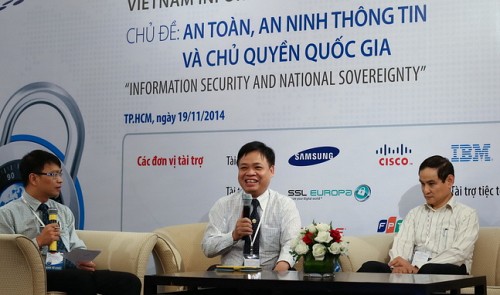Nearly 280,000 cyber attacks have been recorded in Ho Chi Minh City this year, a record 300 percent increase from the previous year, it was revealed at an Internet security conference Wednesday.
Cybercriminals have launched 275,816 attacks on Internet systems in the southern metropolis this year, Le Quoc Cuong, deputy director of the municipal Department of Information and Communications, said at the “Information Security and National Sovereignty” conference.
“The 300 percent increase is an alarming figure,” Cuong said.
Many of the attacks are from China, according to the recorded IP addresses, the official added.
“In 2013 Chinese IPs were recorded from more than 1,000 attacks, whereas the figure in 2014 is nearly 70,000.”
Nearly 25,000 attacks have come from the U.S., while 20,000 have originated from Taiwan, Cuong added.
Vietnam’s ability to defend against cyber attacks remains weak, as proven by the number of websites that have been compromised or defaced, experts said at the event.
Many attacks were for political purposes, especially issues related to Vietnamese sovereignty in the East Sea.
“From the end of August to November 17, 2,500 websites with the “.vn” domain name have been attacked,” Vo Do Thang, director of Athena, an Internet security training center, said, citing data from a foreign website.
“As for government website with the “.gov” domain, 250 were compromised in the first two weeks of this month.”
Thang said this is only the recorded data, and the real number of attacks could be much higher.
Dr. Trinh Ngoc Minh, deputy chairman of the Vietnam Information Security Association (VNISA), said the number privacy breaches in the Southeast Asian country have also soared.
One of the most noticeable cases was the discovery that an illegal phone tracking app had been installed on more than 14,000 Android phones, allowing the company behind the app to manipulate the secretly collected data.
Hanoi-based tech company Viet Hong Co advertised its Ptracker app as being able to help users track other people’s Android phones, read their SMS messages and contact books, record their phone calls and even turn on features like the camera, 3G or GPRS connections from the target devices.
But its customers did not know that all of the data they covertly monitored from the handsets has been transferred to the server computer of Viet Hong Co and is at the disposal of the company’s employees, according to an investigation report released in June.
“We can say this is the most serious and largest data breach case in Vietnam so far,” Minh said.
Internet security experts also pointed out hidden risks from social networks, as users can lose their personal information to hackers and have their Facebook or Twitter accounts stolen.
A report by the southern chapter of the VNISA addressed the case of VCCorp, a Hanoi-based communication center that was severely attacked by hackers last month.
The attack targeted a number of websites powered by VCCorp and left them inaccessible for days, which cost the company some VND2 billion ($94,135) in daily damage.
Even though the cyber attacks targeting Vietnamese victims are becoming increasingly dangerous, awareness on Internet security of local organizations and businesses is decreasing, according to experts.
While only 16 percent of the organizations and businesses surveyed by VNISA in 2012 said they did not know when their systems were compromised, the figure rose to 33 percent this year, according to a VNISA report.
In the meantime, the number of organizations who know that they had been attacked dropped from 40 percent in 2012 to 33 percent in 2014.






















































